A few years back on an early June night a storm raged through the Berkshires, downing trees and knocking out power. Our elderly weeping willow was sheared nearly in half. A massive tangle of shattered limbs and willow wands sat in a forlorn heap on our front lawn. What remained of the tree looked denuded and vulernable — an amputee still in shock.
For years Mike, who cuts our lawn, had railed against that willow. He called it a “dirty” tree because it shed its branches with the same abandon that a teenager discards clothes.
“It’s going to cost you plenty to have me haul this mess away,” Mike told us when he, my husband, and I surveyed the damage the next day. “That tree’s on its last legs. Of course, you can keep paying into my retirement fund, if you want to. But if it was up to me, I’d take the whole thing down.” My husband agreed. The three of us stood there, looking up at the raggedy circle of sky where half the tree had once been, and I felt my heart constrict. The willow had been one of the things —along with a patch of lily-of-the-valley and an old horse barn — that had seduced us into buying the place years ago. Walking around the house at dusk with the realtor, I’d first seen the tree still glistening from an earlier rain shower, backlit with the setting sun, its long wands beckoning. It had seemed to me a spirit of the place. I could feel Mike and my husband waiting for my answer.
“I guess it has to go,” I said. I walked away as the two of them started to confer about chainsaws and wood chippers. I’d agreed, but I couldn’t condone what we were planning.
That night, I woke up with a start. The house was silent, but it was almost as if someone — or something — had called out to me.
The next morning, I told my husband that I’d changed my mind. I’d pay for Mike’s retirement, but the willow had to stay. I tried to explain why, but it came out a lot of new age gobbledygook. A spirit of the place? Yes, something like that. The tree had looked so stoic and wise standing there, knee deep in its own ruin. Just because it was old and broken didn’t mean it didn’t have life left in it. Who were we to take it down? I knew what I was saying didn’t make much practical sense. But then so many right decisions don’t.
These days the willow still looks a little lopsided, but it’s thriving. New growth spurts from its gnarled branches. Hummingbirds nest in its upper reaches and swoop, chattering, through its filaments of green. At night, through the open window, I can hear its limbs creaking in the wind and the swish swish of its willow wands, not unlike the sound of a beating heart.
Here’s a poem by Jane Shore about her own, far more conflicted relationship with a willow tree. For more poems by Jane Shore, click here: https://www.poets.org/poetsorg/poem/willow
Willow Jane Shore It didn’t weep the way a willow should. Planted all alone in the middle of the field by the bachelor who sold our house to us, shoulder height when our daughter was born, it grew eight feet a year until it blocked the view through the first-, then the second- story windows, its straggly canopy obstructing our sunrise and moonrise over Max Gray Road. I gave it the evil eye, hoping lightning would strike it, the way a bolt had split the butternut by the barn. And if leaf blight or crown gall or cankers didn’t kill it, then I’d gladly pay someone to chop it down. My daughter said no, she loved that tree, and my husband agreed. One wet Sunday— the rainiest July since 1885— husband napping, daughter at a matinee in town—a wind shear barreled up the hill so loud I glanced up from my mystery the moment the willow leaned, bowed, and fell over flat on its back, roots and all, splayed on the ground like Gulliver. The house shook, just once. Later, when the sun came out, neighbors came to gawk; they chain-sawed thicker branches, wrapped chains around the trunk, their backhoe ripped out pieces of stump and root as if extracting a rotten tooth. I’m not sorry that tree is gone. No one ever sat under it for shade or contemplation. Yet spring after spring it reliably leafed out. It was always the last to lose its leaves in fall. It should have died a decade ago for all the grief I gave it, my dirty looks apparently the fuel on which it thrived. It must have done its weeping in private. But now I can see the slope of the hill. Did my wishful thinking cast a spell? I was the only one on earth who saw it fall.
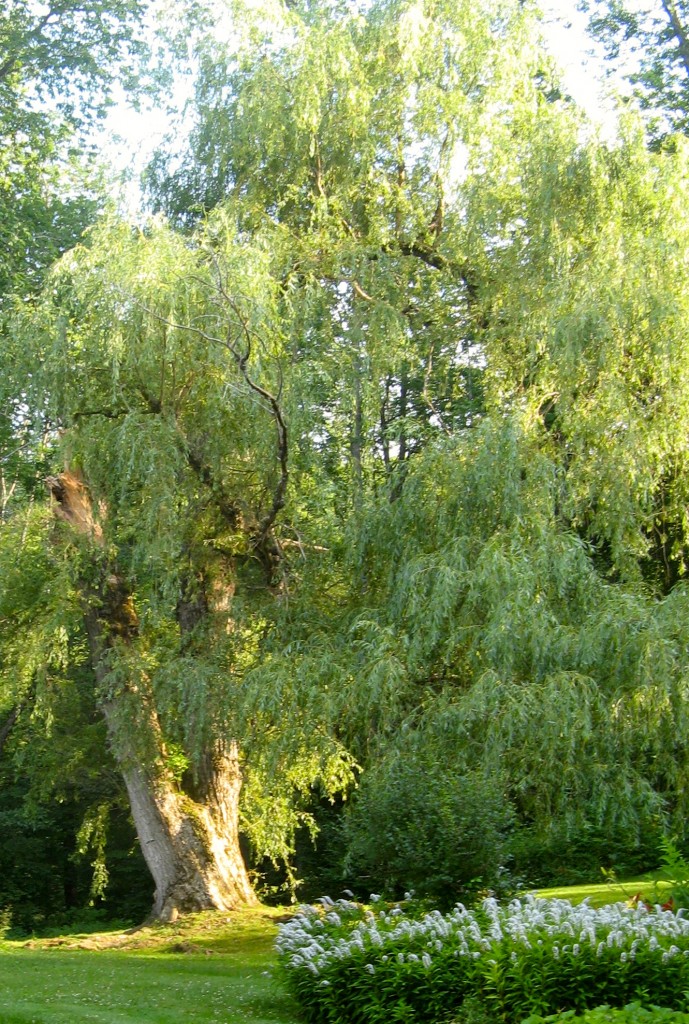
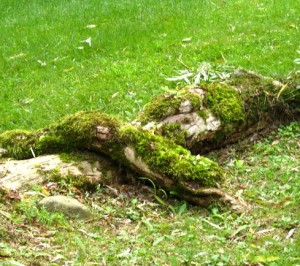
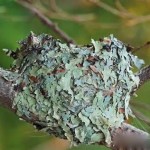

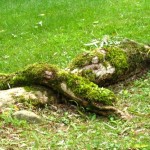
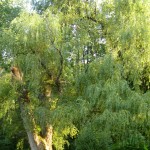
oh, joy! it’s Friday and that means I will be getting my “poetic parcel” from you!
thank you…this one is truly special, I think…
a keeper/keepsake!
Thank you, Annette! So glad you liked this one.
Every amputee is also a whole, beloved, and deserving soul.
You’re so right, Leslie. And this amputee has the amazing ability to regrow its limbs!
Willow trees seem to be beloved by some and tolerated by others. My hubby feels the same way about them as your landscaper does. At our country place in Sussex County we have two willow trees that shed its branches regularly but their beauty certainly overshadows their shortcomings!
So nice to hear from you, Doris, I think that the older and more outsized they get, the more they tend to shed. In early spring, its like a game of pick-up sticks underneath our willow!
I am so glad that you decided to keep the tree. Spirit of place has an ancient meaning to me, one that acknowledges the power of nature to withstand misfortune. The poem seems to have been written with you in mind!
Just back from a drive where I saw a willow that had been cut back almost to the ground — with two new willows growing right out of the trunk. Talk about resilience!
The most touching biography I’ve read in a long time, and one of my favorite blogs.
Bucky
Thanks, Bucky. I think I just saw a scarlet tanager at the top of the willow! A bright splash of red flitting from branch to branch. Beautiful against all that pale green!
Don always loved willow trees, don’t know if one was on his property in New Jersey when he was growing up. But there are some as you drive out to Amagansett on the back roads and they stand out swaying away when the wind comes.
I’m glad you decided to help Mike with this retirement fund!
And I love the poem.
Beata